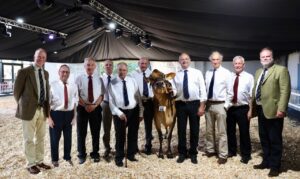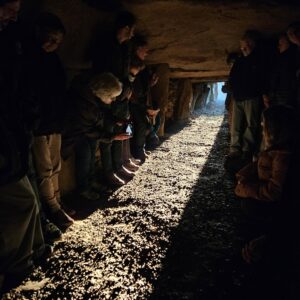
Address to the Jersey Farming Conference by Dr Tim du Feu, manager of the Land Resource Management Team at Natural Environment
The number of people working in the industry and the number of politicians present at this year’s Jersey Farming Conference is testament to the challenges the industry faces – and indeed, to the strong appetite for us to come together to find solutions.
My team covers almost all areas in relation to the protection and enhancement of our wonderful Island’s countryside, its wildlife and environment, the access and public enjoyment of it and the linked areas of the Island’s water and air quality.
I would like to use these areas to explore the links between our environment and farming and explain what getting it right means for our Island.
We have heard mention of the solid foundation that already exists between industry, stakeholders and Government. We can also all attest to the fact that working together will be even more crucial to meet the challenges going forward.
As you may know, our government has undergone some recent restructuring. Of importance to us today, is that the scientific and advisory functions (in Natural Environment) have been separated off from the regulatory functions (in Regulation).
This is important as it opens the door for farmers and the public to come to Natural Environment at Howard Davis Farm to get advice. It also enables officers at Natural Environment to provide the needed research and evidence to inform and direct government policy decisions for the environment and agriculture.
It is about everyone working together towards wider goals. This process is perhaps slower than top-down regulation. But in my experience, it creates dialogue, understanding and delivers longer lasting solutions and, I would suggest, a larger number of unexpected wins.
The Action for Cleaner Water Group is as a joint government, farming and Jersey Water group and represents a clear example of how working together delivers joint environment and farming goals.
An example of the group’s success was the potato and dairy industry that recommended the traffic light system whereby only certain pesticides can be used in certain reservoir areas. Pesticides that are monitored and endorsed by the group and whose detections in streams have reduced considerably over the past five years.
And it was the growers that recommended to trial the use of placement fertiliser when planting to help lower nitrate levels in our Island streams and reservoirs.
We have seen the graph of reducing nitrate levels where levels in our Island streams have reduced by almost half over the past 20 years. I would like to use this as an example to talk you through the wider benefits to the Island, and governmental costs, that ‘getting farming and the environment right’ delivers.
I wonder whether we blow our own trumpet enough in telling the media, the public and our politicians of these wider benefits.
In our work to lower nitrates, I mentioned the practice of placing fertiliser next to the potato tuber, rather than the traditional broadcasting over the field.
This is a win/win situation as farm efficiency has increased due to less fertiliser use and our environment, especially water quality, has improved. I wonder what we would be thinking today if this was not the case given the recent doubling of fertiliser prices?
But what of the other benefits for the Island and its government costs?
For a start, lower nitrate levels equates to better water quality for 3,200 households that rely on private boreholes and wells. This potentially reduces health problems and, in turn, government expense.
Lower nitrate levels also means lower treatment costs for Jersey Water and indeed for the new Waste Water Treatment Works at Bellozanne. Lowering nitrate levels of water that enters the works has potentially saved government millions of pounds for a nitrate removal plant.
Better water quality and less pollution incidents also helps ensure that Jersey Water are able to use all available water. This is vitally important given the recent drought, our future needs for water, the presence of PFAS chemicals around the Airport and St Ouen’s Bay and expected changing weather patterns.
Another Island benefit of lower nitrates is less green seaweed in St Aubin’s Bay with lower clearance costs by government, less nuisance smells etc and a better Island image.
The simple and evidenced example of lowering nitrates at source clearly demonstrates the wide range of positive knock on effects both for farm efficiency and across the Island, both for health of Islanders and government expense.
If we look at detection of pesticide levels in streams and groundwater, which have also considerably improved over the past five years, then one can see similar scenarios.
And what of all the other services that farming provides our island?
The obvious one is management of the countryside by the farming community. A question here: what would it cost the Government and what would the countryside look like if it were not for farming?
Government rightly highlights health and well-being. Having access to a safe and green countryside – the countryside that the farming sector manages was a needed and key Island asset that was enjoyed by many during COVID and continues to be enjoyed by many, especially those living in town.
And the list goes on…. safe access paths for the public, branchage, hedgerow planting, water safeguard buffers, wildlife corridors and habitats, birds on the edge planting and the large areas of cover crops that attract pollinators. These are all benefits of having a viable agricultural industry. I won’t go on, but the role farming plays in the Island’s image, culture and wider economic benefits and international marketing have already been mentioned.
So what does this mean for us today? My question remains in that how often do we tell people about the wider benefits that a responsible and functioning agricultural industry provides to the Island?
We still have work to do to fully capitalise all the possibilities. There are still boreholes with high nitrate levels and we still have some detections of pesticides. Pressures on our countryside and water security will become increasing issues and we must continue to ensure that we work together to meet these new challenges.
With that it is my pleasure to open the afternoon’s session and if I may add to the quote ‘Farming matters’ – not only for important food production but also for a functioning environment and healthy and functioning Island.




